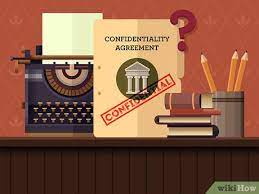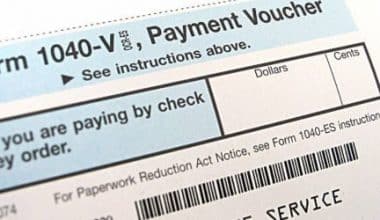When an individual or organization wishes to protect sensitive information about a specific business of a company from a prospective future hire, he or she will have to enter into a confidentiality agreement with the employee. An employee tends to maintain the company’s secret information that is absolutely confidential and makes reasonable efforts to prevent disclosure to others. Let’s look at the confidentiality agreement template in this article to get a better idea of how this agreement would appear.
What Is a Confidentiality Agreement and How Does It Works
A confidentiality agreement is a legal contract between two or more parties that says they can’t share private or company secrets. In most circumstances, this information will be necessary for them to do their duties. This information may include personal information about an employee, a customer, or a client, as well as technical data, records, processes, plans, reports, software, prototypes, or inventions and ideas.
As a result, a confidentiality agreement explains how employees should manage and treat confidential information both during and after their employment with your organization. Along with their Job offer and employment agreement, all new hires should receive a confidentiality agreement.
Employees need enough time to carefully study and comprehend the entire Agreement. They may also consult with a piece of independent legal advice before signing. In most circumstances, you should give the employee at least one week to read, sign, and return the agreement. The following are standard contents and provisions of a Confidentiality Agreement:
- Both parties’ identification (“THE COMPANY” and “EMPLOYEE”)
- A definition of Confidential Information and Intellectual Property
- The exclusions from the confidential treatment of the relevant information or property
- The agreement’s term and date of signing
An employee confidentiality agreement is a corporate legal contract that prevents potential privacy violations. Furthermore, it cautions employees of the risks of misusing confidential information.
A written legal contract between an employer and an employee is a confidentiality agreement that establishes legally binding terms and circumstances prohibiting the employee from exposing secrets about the company. A confidentiality agreement is also in effect for the duration of an employee’s employment as well as for a period of time after termination of employment. It typically lasts one to three years and covers acts that the former employee is prohibited from conducting.
Provisions For Confidentiality Agreements
A non-disclosure agreement is another name for a confidentiality agreement. Confidentiality agreements safeguard confidential firm information such as financial details, business strategy, client lists, or products and services in the works or under development, and prohibit employees from disclosing or benefitting from sensitive information.
These agreements protect patent rights and avoid difficulties in addition to protecting sensitive information. The victim can ask for money damages or compensation for a contract breach after breaking a confidentiality agreement. Most confidentiality agreements also have a clause that says all technology or access to this sensitive information must be turned over before the end of the agreement or employment, whichever comes first.
Confidentiality agreements must include two time periods: when the disclosed material is determined and agreed upon, and when it must be kept secret. If no time frame is provided, there is a greater likelihood of litigation and judicial review to decide what is fair and equitable.
Situations, You Can Use a Confidentiality Agreement
A confidentiality agreement can also be in use in the following situations:
- Managerial and senior-level job applications in which secret company information is discussed and candidates sign an agreement prior to the interview.
- Before assignments, a formal agreement is in need for consultant or contractor contracts, assignment discussions, and goods arising from contractual work.
- Discussions between vendors on goods, parts, and other proprietary information.
- When buying a stock or a company, doing due diligence, or doing any other deal where confidential information is shared.
Employers gain from confidentiality agreements because they prevent employees from disclosing confidential and proprietary information with competitors, such as proprietary knowledge, trade secrets, client or product information, strategic plans, and other confidential and proprietary information.
What Exactly Is Covered by a Confidentiality Agreement?
Some confidentiality agreements are harmless and signed as a formality, but you should consider them twice before signing a template agreement.
- That you are unable to work for a competitor for a period of one to two years.
- Anything you came up with while working for the company is its property, even if you did it on your own time.
- If there is a problem with the contract, you must waive your right to a trial.
- It’s crucial to make sure you’re not agreeing to anything that would make it difficult for you to get another employment if your current one doesn’t work out.
Always read the confidentiality agreement carefully before signing it, and don’t be afraid to seek clarification on what the agreement means to you. It’s crucial to know the facts about the contract before you sign it, as uncomfortable as it may be to challenge the interviewer. For example, if you’re laid off, don’t expect the firm to give you a pass.
However, you may be asked to sign a confidentiality agreement before an interview in rare situations. This happens for a variety of reasons, for starters, they might not want you to know about their interview questions or hiring procedures. Alternatively, they may be planning to discuss company difficulties or problems with you that they don’t want to make public. In other circumstances, the interview may contain trade secret disclosure.
Employee Confidentiality Agreements’ Purpose
While employee confidentiality agreements are a common corporate practice, it’s important to know what they’re for.
- To reduce the possibility of corporate secrets leaking.
- Dissuasive to anyone who would consider making a purposeful disclosure. Such people are well aware of the heinous consequences of their illegal conduct.
- Advantage on the court. In circumstances of misappropriation of secret information, a non-disclosure agreement might help the corporation win in court.
Template of an Employee Confidentiality Agreement
Let’s take a look at this confidentiality agreement template for more understanding.
This agreement is made on ________________________(“Employee”) and [Company Name] on
As a result, the employee commits to the following in order to protect confidential information during employment:
- Employees shall treat the confidential information obtained from the company with the utmost care. Also will take reasonable precautions to prevent disclosure to others.
- Employees will not disclose or divulge confidential information to others, either directly or indirectly, unless the company management has given them written permission to do so.
- The employee will not replicate the confidential information, nor will he or she use it commercially or for any other purpose than performing his or her obligations for the Company
- An employee will deliver any designs, notes, papers, equipment, and materials obtained from the company or originating from employment with the company to another company upon the termination of his/her association with the company.
- Employees’ inventions, writings, ideas, and discoveries will be treated solely by the company. This includes the right to keep them as a trade secret. Use and share them without filing patent applications. File copyright registrations in its own name, or do anything else that is legal.
- In addition to pursuing civil or criminal penalties, the company reserves the right to take disciplinary action, up to and including termination, for violations of this agreement.
- The laws of the state of ___________ will be in use to interpret and control this agreement.
- All provisions of this agreement will only apply to the extent that they do not contradict any relevant law. And they intend to limit the extent necessary to keep this agreement from becoming invalid, unlawful, or unenforceable.
What should a confidentiality agreement contain?
A confidentiality agreement does not have to be elaborate or full of legal jargon. It merely needs to cover the essential facts in a clear and straightforward manner. While some confidentiality agreements will include more details as stated in the template.
The agreement’s parties should be listed at the beginning of the document. The employee would be the “recipient” of sensitive information, while the organization would be the disclosing party. List situations where an employee could share “secret information” without infringing the agreement if the material is public. Keep in mind that employees can be legally compelled to provide personal information if they are served with a subpoena.
It can also contain an indefinite agreement that requires employees to keep the information confidential indefinitely, i.e. forever. To safeguard the organization. Due to the potential for damages from a breach, organizations should state whether they plan to seek legal remedies.
Businesses may desire to clarify which state’s laws will apply in the event of a dispute. As well as what materials employees must return or dispose of if they depart. Some employers include non-solicitation agreements to prevent former employees from poaching clients. State law will determine whether these are enforceable, so employers should research local policy.
Employee Confidentiality Agreement Problems
In employment law, the issue of secrecy is extremely important. However, there are significant disadvantages to having a rigid employee confidentiality agreement which also appears in the template.
#1. Enforcing the Law Is Expensive
In recent years, most average-performing corporations have struggled to enforce confidentiality agreements. There are other reasons for this, despite the fact that high courts despise these agreements.
To enforce these contracts, you must first sue the party who has broken them. Furthermore, the procedure necessitates a significant amount of time and effort, particularly if there is no damage. Before you lose money in this situation, assess the benefits and drawbacks.
#2. Have Restrictions
Contracts are subject to some legal restrictions depending on the subject matter, time duration, and geographic area. Experts often believe a nondisclosure agreement to be fair when the terms between the company and the employee are less than two years.
#3. It Has the Potential to Be a Turn-Off
High-performing employees may perceive overly strict employee confidentiality agreements as unfair or disrespectful. As a result, employees who are uncomfortable working under such conditions may opt to work with more forgiving competitors, which might lead to terrible outcomes.
Confidentiality Agreement Approaches
Before signing a secrecy agreement, employers should talk to a lawyer who specializes in employment law. Because recent court decisions have said that these kinds of agreements don’t hold up. When a judge says that an agreement was too broad, the terms of the agreement will make things harder. If your provisions and requirements are unduly restrictive, an attorney would be able to tell you.
Finally, implementing a confidentiality agreement when you first hire an employee is significantly easier. Because the employee is aware that it is a requirement for employment before accepting the job. When a prospective employee accepts your job offer, the confidentiality agreement becomes part of the terms and conditions of employment.
Employees perceive the implementation of an agreement after hire. In some cases, years later as the employer changes the terms and conditions of their employment. Some employees may refuse to sign, causing you to lose personnel you wished to keep.
What is the difference between an NDA and a confidentiality agreement?
An NDA maintains secrecy by forging a confidential bond between the parties who sign it, whereas a confidentiality agreement commits all parties to keeping sensitive material private.
Is a confidentiality agreement legally binding?
Non-disclosure agreements, or NDAs as they are sometimes known, are binding contracts between parties that guarantee the confidentiality of specific information.
Can you legally break an NDA?
As civil contracts, NDA violations are not legally punishable. However, there can be serious financial repercussions. By breaking an NDA, you bring yourself up to legal action from your company, which could result in cash penalties as well as potential court fees.
What voids a confidentiality agreement?
An agreement may be void if the language is overly vague, unreasonable, or burdensome. Additionally, agreements that are too broad, oppressive, or attempt to hide non-confidential information will be challenged or declared invalid by the courts. In the event that the material is later made widely known, an NDA will no longer be enforceable.
What happens if you break a confidentiality agreement?
If the Receiving party violates an NDA, the Disclosing Party may initiate a lawsuit to halt further disclosures and to recover damages from the offending party. NDAs are inexpensive, simple legal contracts that protect the confidentiality of information shared between two or more parties.
How long can an NDA legally last?
Confidentiality agreements may either expire on a specific date or event, covering the parties’ disclosures of secret information at any time, or they may continue eternally.
Confidentiality Agreement FAQs
What employee information is confidential?
Personal data: Social security number, date of birth, marital status, and mailing address. Job application data: resume, background checks, and interview notes.
What happens if you break a confidentiality agreement?
If you break a confidentiality agreement as stated in the template, you could face legal action from your employer, and you could be forced to pay monetary penalties as well as legal fees.
Why is a confidentiality agreement important?
It’s important because safeguard and maintain the confidentiality of any act that violates the agreement’s objective and results in a breach for which the disclosing party can seek remedies.
Related Articles
- Invoice Discounting: Explained!! (+ Quick tools & amp; all you need)
- Eccentric Security Issues of Blockchain in 2023
- Is a Personal Loan Good to Take?
- Subscription Agreement: Top 7+ Subscription Agreement Templates to help you (+ Detailed Guide)
- Purchase Agreement: Real Estate Buy and Sell Contract






